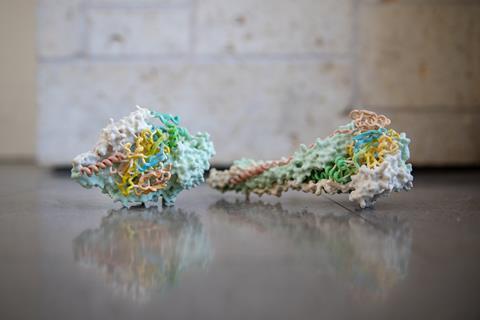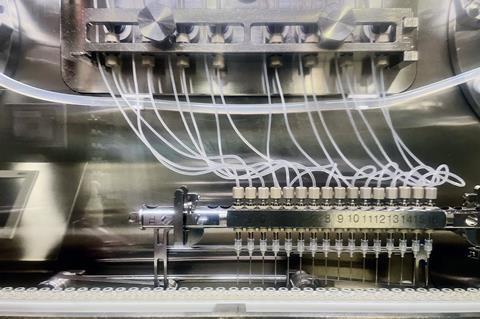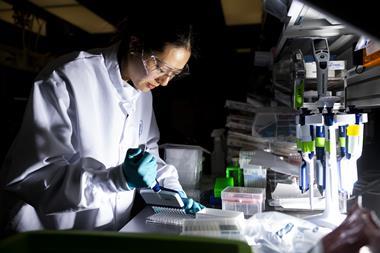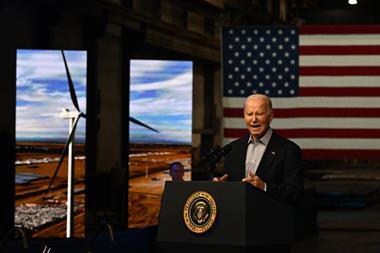New vaccines and a long-acting antibody aim to protect older adults and babies from respiratory syncytial virus
It has been several decades since the monoclonal antibody Synagis (palivizumab) was approved as a preventative for severe disease caused by respiratory syncytial virus (RSV) infection.
But it seems possible that, by the end of the summer, there will be three brand new therapies – including two vaccines and a long-acting antibody – approved for the prevention of RSV lower respiratory tract disease in Europe and the US.

The arrival of multiple new therapies all at once is not a coincidence, but the product of decades of fundamental scientific research to understand the structure of the virus’ fusion protein; a surface protein that locks on to host cells, fusing the viral envelope with the host cell membrane.
‘[It has been] accelerated by some very basic research in fundamental virology, immunology and protein folding, which has led to an understanding of what it is that is protective, and how immune responses are induced by the pre-fusion configuration of the viral fusion protein,’ explains Peter Openshaw, a professor of experimental medicine at Imperial College London. ‘[This] has led to stabilised pre-fusion vaccines, which induce a much more effective neutralising antibody than the degraded, post-fusion, flipped form of the protein,’ he adds.
RSV is a common, seasonal virus that usually causes mild, cold-like symptoms. However, it can be extremely serious in adults over 60 and infants. These vulnerable cohorts are therefore the focus of efforts to develop the next preventative.
Stabilised pre-fusion vaccines induce a much more effective neutralising antibody than the degraded, post-fusion, flipped form of the protein
Several big hitters including Pfizer, GSK, Moderna and Johnson & Johnson (J&J) have been working on vaccines to protect the over 60s against the potentially fatal virus.
Pfizer and GSK are racing ahead. GSK’s vaccine candidate, Arexvy, was approved for over 60s by the US Food and Drug Administration (FDA) in early May 2023, the European Medicine’s Agency (EMA) in June, and UK’s Medicines and Healthcare Products Regulatory Agency (MHRA) in July. The FDA approved Pfizer’s vaccine, Abrysvo, for the same cohort in late May 2023 (at the time of writing the EMA was still reviewing this vaccine).
In January, Moderna released promising phase 3 results from a trial of its mRNA-based vaccine in people aged 60 and over. The company has now begun submissions for regulatory approval in the US, EU, Switzerland and Australia.
Meanwhile, in March, J&J shelved development of its adenovirus-vectored vaccine after an assessment of the ‘RSV vaccine landscape’, despite positive results from its phase 2 trial in adults aged 65 years and over.
Doubts around maternal vaccination
Trials of RSV vaccines for pregnant mothers have produced more complex results. Vaccinating during pregnancy generates high levels of maternal antibodies, which transfer through the placenta into the foetus, protecting babies through the first few months after birth.
Both Pfizer and GSK are developing versions of their vaccines for pregnant mothers. However, in February 2022, GSK voluntarily stopped its phase 3 ‘Grace’ trial as well as two other maternal vaccination trials. This was after data from the phase 3 trial showed a higher proportion of preterm births in the treatment group, compared to the control group.

Although the overall incidence of preterm birth remained low in both groups, and below the preterm birth background rates for most of the participating countries, this ‘observed imbalance’ was deemed statistically significant.
The data also showed a higher number of deaths occurring in the first 28 days after birth in the treatment group compared to the control group. It was concluded that this was a consequence of the imbalance in preterm births and not a separate safety signal.
‘We are still investigating the cause of the safety signal and, currently, do not have a mechanistic explanation for it’, a GSK spokesperson told Chemistry World.
‘The preterm birth imbalance was not observed in any other clinical trial investigating the RSV maternal vaccine. Since voluntarily stopping the enrollment and vaccinations in the RSV maternal trials, GSK has regularly updated regulatory authorities, investigators, ethics committees and the independent data monitoring committee about the safety signals and findings from analyses and investigations, and will continue to do so,’ the spokesperson added.
‘Study participants were updated and informed throughout the course of the trial via investigators. A follow-on study to monitor subsequent pregnancies has been initiated.’ Further data are expected in the coming months as safety follow-up studies are ongoing.
‘It’s a real puzzle’, says Openshaw, who has studied RSV for many years. ‘It’s hard to imagine what happened – was there some [other] factor operating in particular locations, because it wasn’t in all the locations in which the study was being done [the preterm imbalance was greatest in low- and middle-income countries], and it also appeared to be confined to a particular period. Was this an interaction with some other environmental factor or the administration of some other vaccines in addition, or was there some co-infection happening?’
‘It’s so important that we have all the information to try and work out what it was, that might have led to the safety signal,’ he adds. ‘I think it’s very important that the data are carefully examined, and that specific monitoring is performed in any future stage.’
The interim trial data from Pfizer’s maternal vaccine, published in April 2023, did not identify any safety concerns. However, due to the similarities between the vaccines, experts have urged for further analysis of the trial data to be carried out.
Similar, but different
The Pfizer and GSK vaccines are based on ‘very similar technologies; along the lines of conventional protein-based vaccines’, Openshaw tells Chemistry World.
The Pfizer vaccine is bivalent, containing stabilised forms of the pre-fusion conformation of the F-protein from both RSV-A and RSV-B virus sub-types. GSK’s vaccine is also based on a stabilised pre-fusion F-protein. The formulation for older adults also includes an adjuvant (ASO1E, derived from saponins from the Chilean Soapbark tree) to boost the immune response. Its maternal vaccine does not contain the adjuvant.
I think there’s space for other antibodies to be used, alone or in combination. It’s a developing field
Pfizer maintains that its external data monitoring committee did not see any statistical difference in the number of adverse events of prematurity between those immunised with the vaccine candidate or the placebo. ‘Our overall analysis demonstrating there is no statistical difference in premature births was submitted to the US Food and Drug Administration’ a Pfizer spokesperson told Chemistry World.
The FDA’s advisory committee met on 18 May 2023 to review Pfizer’s maternal immunisation safety and efficacy data. While committee members were in positive agreement on the efficacy data, they were split when it came to the safety data, with four out of 14 voting that the data were not adequate to support safety. These recommendations will now be taken into consideration by the FDA with a decision expected by August 2023.
Another option for infants
Openshaw says that the current lack of understanding around the mechanisms behind the GSK safety signal is a ‘definite setback’ to maternal vaccination against RSV.
‘[The vaccine works by] inducing antibodies in the mum,’ he explains. After 36 weeks into pregnancy, these antibodies can transfer to the foetus across the placenta, but premature babies born before that point wouldn’t get the same protection, he points out. The mother’s antibodies can also transfer in breast milk, protecting babies after birth.
However, he highlights that AstraZeneca and Sanofi’s Beyfortus (nirsevimab), a long-acting antibody treatment which also targets the pre-fusion form of the RSV fusion glycoprotein, is a more direct way to protect babies, even those born prematurely or who aren’t being breastfed.
A significant benefit of nirsevimab, compared to the older pavilizumab, is that only a single intramuscular injection is required to protect infants for the entire RSV season. With pavilizumab, children have to be given monthly doses during the RSV season.
Europe was the first to grant approval for the use of nirsevimab in infants in November 2022, closely following by the UK. The US FDA approved the antibody in mid July 2023.
However, there is the important issue of resistance to consider. ‘If nirsevimab were rolled out on a population scale, there would be pressure put on the virus to evolve mutations which are nirsevimab-resistant,’ says Openshaw. ‘I think there’s space for other antibodies to be used, alone or in combination,’ he adds. ‘It’s a developing field.’
The road to developing a new preventative against RSV has seen its fair share of bumps, and the future of a maternal vaccine is still yet to be determined. However, with the recent flurry of approvals, patients may not have to wait much longer to access the new therapies. And not a moment too soon.
At the end of 2022, the European Centre for Disease Prevention and Control said more countries were reporting an increasing number of paediatric hospitalisations and rising pressure in healthcare facilities due to RSV co-circulating with other respiratory viruses, such as flu and Covid-19, suggesting that these new tools will be invaluable.
Ed. This article was updated with US approval for Beyfortus (nirsevimab) on 18 July 2023

















No comments yet